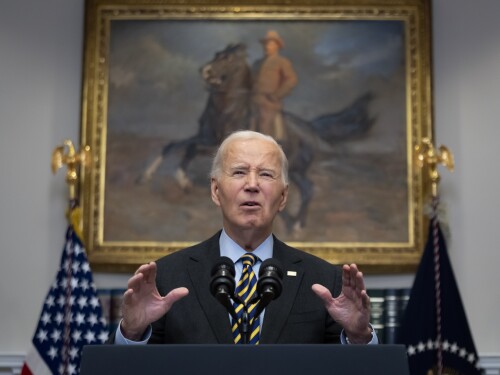President Joe Biden’s symbolic declaration on Friday that the Equal Rights Amendment is “the law of the land” likely only sets up more debates for Congress and the courts over the constitutional prohibition on gender-based discrimination.
Here’s a rundown on what the ERA is, how long it’s been debated and what Biden’s action means:
What is the Equal Rights Amendment?
The ERA is a 1970s-era prohibition on discrimination based on gender, guaranteeing men and women equal rights under the law. As a constitutional amendment, it needs ratification from three-quarters of the states before it’s added to the U.S. Constitution.
How long has the push to codify the ERA been going on?
There have been debates over the ERA ever since it was initially approved by Congress.
The ERA was initially sent to the states for ratification in 1972, and Congress set a deadline of 1979 for three-quarters of state legislatures to ratify it. That deadline was then extended to 1982.
But it wasn’t until nearly 40 years later, 2020, when Virginia lawmakers voted to ratify the amendment, meaning that the necessary 38 states had ratified it. Congress tried in 2023 to lift the deadline to allow for the amendment’s ratification, but the measure didn’t reach the required 60-vote threshold in the Senate.
What’s the archivist’s role in ERA certification?
The director of the National Archives is responsible for certifying and publishing new amendments once they meet the required ratification threshold.
Last month, the archivist and deputy archivist of the United States said in a rare joint statement that the ERA could not be certified without further action by Congress or the courts, saying that either entity must change the deadline to consider the amendment as certified.
A senior Biden administration official, speaking on the condition of anonymity to discuss the White House’s plans, said the Democratic president was not directing the archivist to certify the amendment.
Does Biden’s action on the ERA change anything?
Not really. Biden’s move is largely symbolic, and it’s unclear if his statement will have any impact. Presidents don’t have any role in the amendment process. And the leader of the National Archives has said that the amendment cannot be certified because it wasn’t ratified before a deadline set by Congress.
Democrats have been pushing Biden to act unilaterally on its ratification before he leaves office next week, and some members of Congress planned to rally Friday at the National Archives.
Sen. Kirsten Gillibrand, who has led the effort among Democrats in the Senate, has insisted that the archivist’s analysis was flawed. Gillibrand previously said Colleen Shogan was “wrongfully inserting herself into a clear constitutional process, despite the fact that her role is purely ministerial,” encouraging Biden to certify the ERA anyway over Shogan’s objections.
This article was originally published by the Associated Press.







